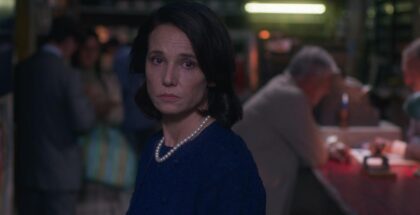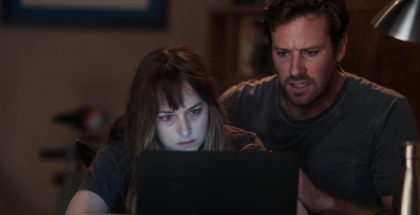Shirley review: An enthralling portrait

Review Overview
Elisabeth Moss
9Chaotic vibes
8Women being left alone
9Rating
Billie Melissa | On 30, Oct 2020
Director: Josephine Decker
Cast: Elisabeth Moss, Michael Stuhlbarg, Odessa Young, Logan Lerman
Certificate: 15
Watch Shirley online in the UK: Netflix UK / Curzon Home Cinema / TalkTalk TV / Virgin Movies / Rakuten TV / Google Play / Sky Store / CHILI
Elisabeth Moss steps into the prolific shoes of renowned horror/mystery writer Shirley Jackson in Josephine Decker’s Shirley. Michael Stuhlbarg plays her husband, literary critic and professor Stanley Hyman, who invites a student and his wife to stay in his home as they find their footing as newlyweds. Rose (Odessa Young) is enlisted as a temporary helping-hand to Shirley by Stanley at the encouragement of her husband Fred (Logan Lerman), despite them both having a desire to study. She reluctantly complies and falls into an initially contentious friendship with Shirley that manifests uncannily.
Shirley takes its time to find its feet, initially trudging drearily at a slow and steady pace while Rose tiptoes around Jackson’s finite temper. Any inch of small talk gets met with snark, even flippant statements. “Writing’s going well, then?” is answered with the exasperated: “Don’t ever ask me that again.”. (Anyone who has put pen to paper will say this is a valid response to that question.)
The film does ultimately pick up when Rose and Shirley are left to their devices. Moss is its strength, pulling everything into her orbit, from her first appearance spread in an armchair, surrounded by admirers, down to the very last frame. She is electric and playful; just one glance from her could kill.
Odessa Young makes a fantastic companion to Moss’ performance, initially the antonym of all that Shirley is, yet uncontrollably curious of what lies beneath the surface. Their scenes are enthralling, and their chemistry together is more beguiling than theirs with their husbands.
While the men deem themselves to be scholars, indulging in all the frivolities that come with it, they are missing out on a world that exists solely between their wives. Decker looks at the intimate lives of women when men are no longer in the room, the expectations of what the men believe to be happening versus the reality of it. The intimacy even takes place before their very eyes, under the table or in the next room, and yet it remains unnoticed. They instead make commentary on their art and ignore the importance of Rose and Shirley’s work, often disregarding it and ultimately pushing the two closer together.
Moss and Young become two sides of the same coin, and the way their characters eventually bleed into one is a sign of Decker’s visionary touch. She has built a devilishly hedonistic world for her actors to live inside. It does feel as though it may lose control by the end, but the chaos is a pleasure to be part of.
Shirley is available on Netflix UK, as part of an £9.99 monthly subscription.
Where can I buy or rent Shirley online in the UK?
Related Posts
We Are One: Global Film Festival | What to watch and when... May 26, 2020 | David Farnor

VOD film review: 1976 March 26, 2023 | David Farnor

Trailer: Netflix’s Wounds set for October release... October 4, 2019 | David Farnor

LFF 2016 reviews: Arrival, La La Land, The Happiest Day in the Life of Olli Maki... October 10, 2016 | David Farnor


















